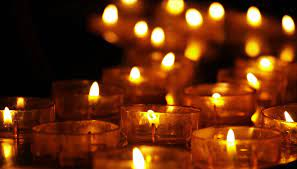The continent and nations of Europe have never suffered as much loss since World War II, attributed to the Covid-19 virus, which has been devastating among us for a year. Now, as I write these lines, according to WorldOMeter, there have been 2,723,780 deaths worldwide so far, with more than 123,555,600 having been infected with the virus. The number of recovered cases is almost 100 million. In Europe, 37,488,747 were infected with Covid-19. 877,103 people have died on our continent as a result of the pandemic.
Nearly one million Covid victims in Europe alone. If we estimate the number of relatives to be at least 5-6, including mourners and grievers, this will affect at least 5,263,000 people, or even double. This does not include the number of friends, acquaintances, neighbors, co-workers, etc., who are shocked and face a meaningless passing away. Europe has not really carried so many grieving, sad people on its shoulders since the last great World War.
That is why the time has come to give birth to the initiative that has already taken shape in our souls and is now in a public form, launched on March 17 by Dario Nardella, President of Eurocities, the organization of European Cities and the Mayor of Florence, which brings together 197 European cities. On their website, we read:
A MINUTE OF SILENCE FOR EUROPE
One year after the start of the coronavirus epidemic, the Eurocities network invites everyone for a quiet minute in Europe. The joint commemoration will take place on Wednesday, March 24, at noon.
"Europe needs a moment of common thinking, of reflection," said Dario Nardella, President of Eurocities and Mayor of Florence. "Let's take a one-minute break to mourn the dead, honor those affected by the pandemic, and reflect on our own situation — take a deep breath in the troubled struggle of all of us."
Since this event of compassion cannot be accomplished otherwise at this time, everyone is asked to keep a minute of silence. Dario Nardella (mayor of Florence, the classic city of love, life, the literary city of Romeo and Juliet) also writes in his appeal: "I invite everyone to join this call and remain silent for a moment, remember and find new strength together." The minute of silence will take place on Wednesday, March 24, 2021, at 12:00 Central European Time.
In fact, the mayor of Budapest, Gergely Karácsony, announced on Facebook's accession to the Eurocities initiative on Facebook. On his Facebook page, he puts it this way: a gesture of one minute of silence does not reduce the pain of grief, it does not alleviate the much suffering caused by the epidemic and its consequences. But perhaps it is apt to remind ourselves: we cannot care, we cannot get bogged down in the dramatic data we release every day. Because behind the data, the numbers, the statistics, there are destinies and people, people who are loved and cherished. Their absence is irreplaceable, it is a duty to remember them, to share the grief of their loved ones. And there is no day that we do not owe a debt of gratitude to those who are fighting for lives in hospitals and surgeries, in ambulances.
I deeply agree with the Eurocities initiative as a Hungarian and European citizen, as a pastor of the Reformed Church in Hungary, as a public writer and journalist, as a researcher in social ethics. Taking seriously the legacy of nearly 500 years of European Protestant ethics of responsibility, our creeds, especially Scripture, I hear the command of the hour from the call of Florence, which evokes the suffering of Christ the Redeemer for us and for all. In particular, the initiative also makes relevant the apostle Paul’s exhortation in his letter of liberty, the Epistle to the Romans, “Weep with mourners” (Romans 12:15). Now is the time for compassion and condolence at European and national levels. In such cases, there is no place for reasoning, partisanship, vanity, competition. Before death, especially before God, we are all equal, fallen, in need of the comforting, encouraging, human, divine word. The deceased are equally in need of a remembering, respectful, thought-provoking and clarifying silence.
And in Part 3 of the book of Ecclesiastes, nearly 3,000 years old, we read: Everything has its own time, and there is a specific time for every activity under heaven: a time to be born and a time to die, a time to plant and a time to pull out what was planted, a time to kill and a time to heal, a time to tear down and a time to build up, a time to cry and a time to laugh, a time to mourn and a time to dance... a time to tear apart and a time to sew together, a time to keep quiet and a time to speak out, a time to love and a time to hate, a time for war and a time for peace (Ecclesiast 3: 1-4; 7-8). Now it is time to listen and speak.
We are not silent before Covid-19, but before God. We are not speaking against God, but before Him. We speak before him for the old Europe, for the nearly one million Europeans, for those who have gone and remain, for those who remember in silence or tears. Mainly to ask Him to send His Spirit so that we can really think about it, to reflect on what we have received from this epidemic, and what it is that Europe and our people need to recover from at such heavy losses. With such thoughts, I will stop in silence for one minute on the 24th of March at noon with my hands and soul locked in prayer...












